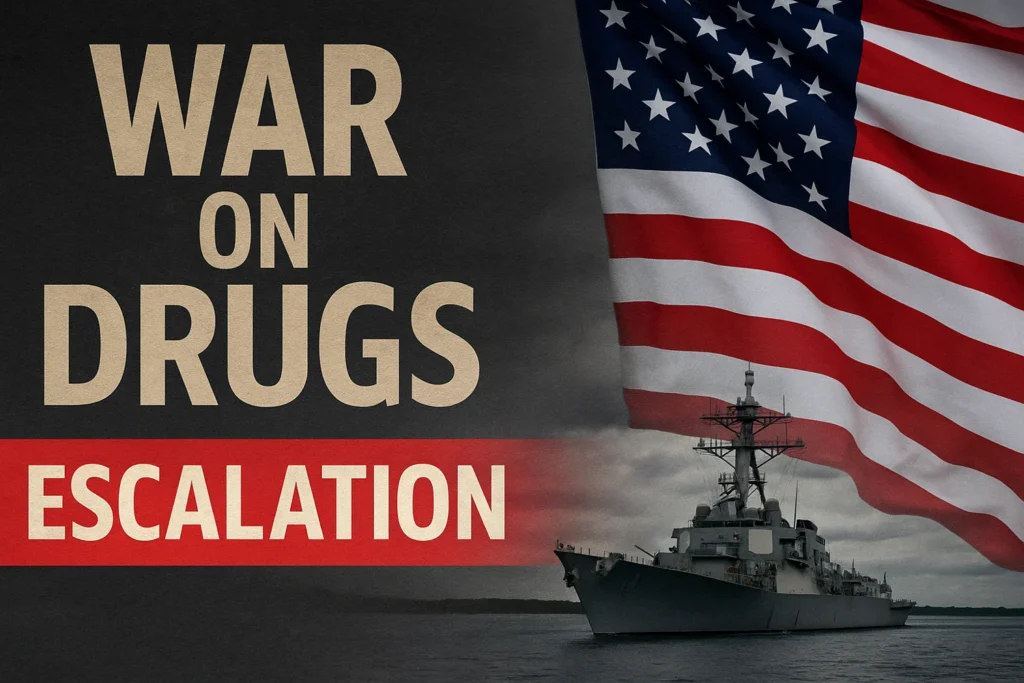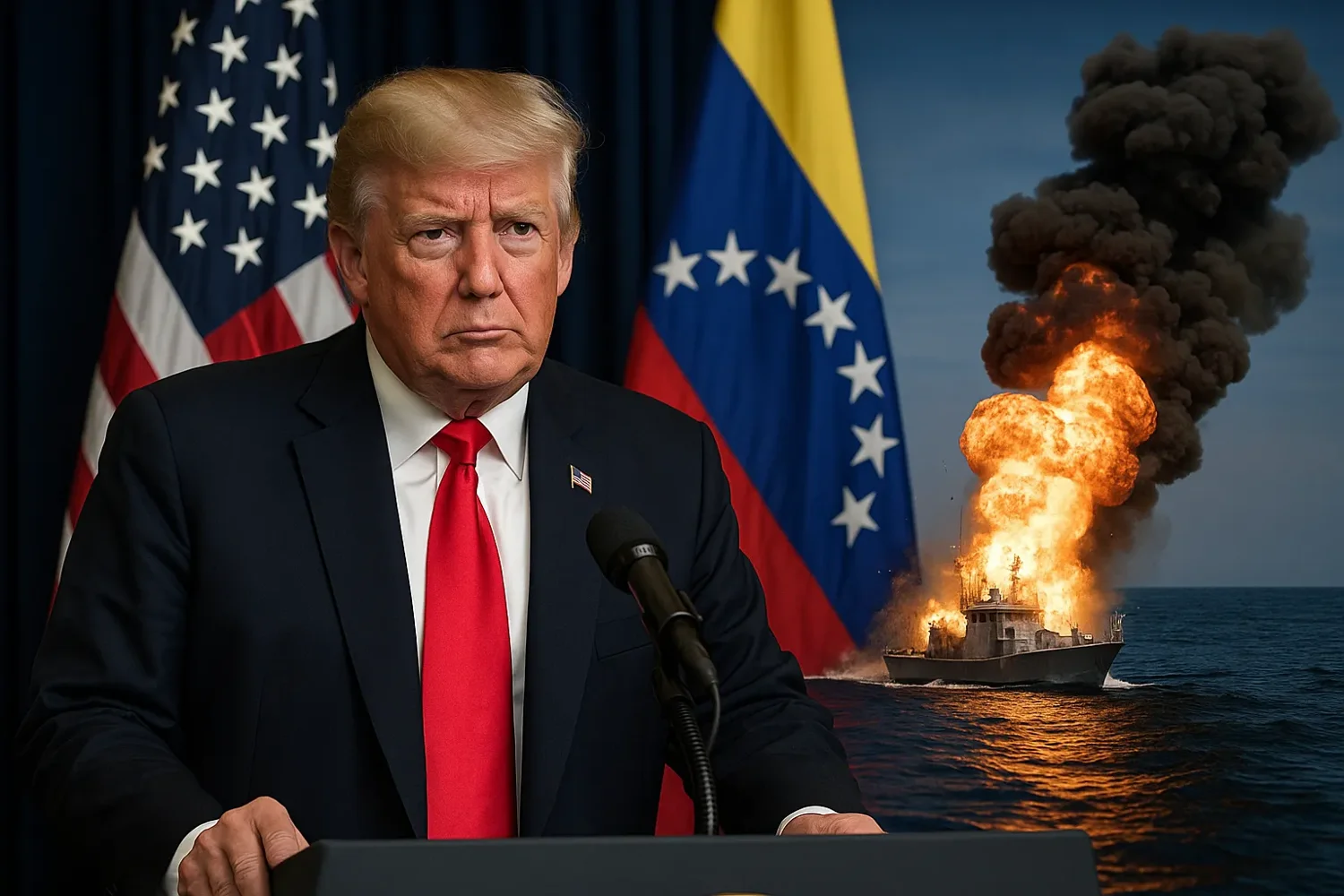The destruction of a second Venezuelan drug vessel by US forces has been framed as a clean victory against narcotics trafficking. Three suspects are dead, the White House is triumphant, and the mainstream headlines cheer the toughness of American policy. Yet this story is not about drugs at all. The Trump Venezuela drug vessel strike exposes the hypocrisy of the so-called “war on drugs” and reveals a deeper truth: Washington uses narcotics as a pretext to project military power, ignore international law, and tighten its grip over Latin America.
Context: the official story
The Trump administration insists the destroyed boat was a trafficking vessel operated by Venezuelans in international waters. According to military reports, the suspects posed an imminent threat, forcing US forces to act. Trump himself praised the strike as evidence of his uncompromising stance on security. The Pentagon presented it as a defensive measure against organized crime.
Venezuela, however, condemned the action as an act of aggression. Officials in Caracas argued the attack occurred without proof, without trial, and outside the framework of international law. They labeled it “piracy under a flag.” Despite this outrage, Western outlets largely repeated Washington’s version — that three suspected traffickers were “neutralized” in a legitimate enforcement mission.
The official narrative is simple: the US protects its borders, the suspects were criminals, and the world should applaud decisive action. But the simplicity is deceptive.
Oppositional Argument: when law enforcement becomes undeclared war
The Trump Venezuela drug vessel incident highlights how law enforcement language masks acts of war. By calling a boat a “narco-vessel,” Washington grants itself permission to destroy it. Suspicion becomes guilt. Military force becomes justice. Death at sea becomes evidence of “success.”
This is not drug control. It is undeclared warfare under the banner of national security. The US has long weaponized the drug war to expand its reach. Every strike bypasses courts, ignores due process, and replaces law with unilateral power.
Critically, the US does not apply these standards universally. Allies engaged in trafficking are handled quietly; adversaries are targeted with force. The Trump Venezuela drug vessel case is not about neutralizing crime but about sending a political message: resistance to Washington will be met with violence, dressed up as justice.

Analytical Breakdown: why Venezuela, why now?
Why target Venezuelan boats specifically? The timing matters. Trump has escalated sanctions, diplomatic isolation, and military pressure on Caracas. Venezuela represents a symbolic enemy: weakened, sanctioned, and politically demonized.
The “drug vessel” label offers Trump a narrative of toughness. At home, he can claim to be protecting families from narcotics. Abroad, he demonstrates that no waters are beyond American reach. The target is convenient: Venezuela lacks allies strong enough to respond.
This pattern echoes US policy across decades. In the 1980s, Washington used narcotics allegations to justify interventions in Panama and Nicaragua. The invasion of Panama in 1989 was sold as the arrest of a “drug-trafficking dictator.” The same script plays today. Drugs are never the core issue; regime control is.
By sinking Venezuelan boats, Trump sends three messages at once: to Americans, that he is decisive; to allies, that the US still dominates the hemisphere; and to enemies, that defiance will be punished violently.
Human Perspective: forgotten lives and invisible fear
The official reports say three suspects died. But behind those sterile words are human beings. Their names are absent, their trial never held, their voices never heard. Families in Venezuela are left with silence and anger.
In Caribbean fishing communities, fear spreads. Ordinary fishermen now worry that radar errors or false intelligence could turn their boats into “suspected drug vessels.” Imagine being a father taking his son out to fish, only to see a foreign warship on the horizon, deciding in seconds whether you live or die. That is the human cost of militarized enforcement.
Moreover, communities already suffering from economic collapse face further hardship. When boats are destroyed, livelihoods are lost. Even innocent trade is chilled, because who dares sail when suspicion equals death? These are the unseen victims of the Trump Venezuela drug vessel strike.
Stories from the region
Fishermen in Trinidad speak of boats halted at gunpoint. Families in coastal Colombia recall loved ones never returning after “encounters” with patrols. Venezuelan migrants in Aruba share stories of being profiled as smugglers. These cases rarely reach Western media, but they form the lived reality of a region where US anti-narcotics operations blur the line between policing and warfare.
International law and the erosion of norms
One of the most dangerous aspects of the Trump Venezuela drug vessel operation is its precedent. International waters are governed by maritime law. States are not free to sink vessels on suspicion alone. Yet the US acts as though it owns the seas.
The doctrine of “hot pursuit” allows some enforcement beyond borders, but it requires clear evidence, proportionality, and accountability. None of these conditions are met when three men are killed without trial. This undermines the very idea of international law.
What happens when Russia sinks a boat in the Black Sea, claiming it was “smuggling”? What if China does the same in the South China Sea, citing “security threats”? By normalizing suspicion-based strikes, the US sets a precedent it cannot control.
Counterarguments and their flaws
Defenders argue the strike was necessary. They say Venezuela’s government is complicit in trafficking, leaving Washington no choice. They insist that decisive action saves lives by cutting drug supply.
But these claims collapse under scrutiny. First, if Venezuela is complicit, that is an argument for diplomacy and international courts, not unilateral executions. Second, the link between striking boats and reducing drug supply is unproven. Billions spent on the war on drugs have not reduced addiction in the US. Killing suspects at sea will not solve it now.
On the contrary, such actions fuel resentment, feed anti-Americanism, and embolden authoritarian leaders who point to US hypocrisy. Trump may claim victories, but each strike erodes trust, law, and stability.
Historical parallels: the drug war as empire’s tool
The Trump Venezuela drug vessel strike is not an anomaly. It fits into a century-long pattern of US power projection in Latin America. From the Monroe Doctrine to the Cold War, Washington has justified intervention with shifting excuses: communism yesterday, narcotics today, terrorism tomorrow.
The “war on drugs” in particular has been a convenient mask. In Colombia, Plan Colombia poured billions into military aid, strengthening elites while devastating rural communities. In Mexico, militarization led to mass killings, disappearances, and corruption — yet the drug trade thrives.
The lesson is clear: militarized drug policy never ends drugs, it only entrenches US influence. The Trump Venezuela drug vessel case is the latest chapter of this failed, destructive model.
Analytical consequences: what comes next?
The immediate consequence is further deterioration of US-Venezuela relations. Diplomatic channels already frozen by sanctions will now harden into hostility. For regional powers like Brazil and Colombia, the strike raises uncomfortable questions. Do they support Washington’s line, or do they defend sovereignty?
Globally, the strike adds to perceptions of US hypocrisy. Washington lectures others about law, sovereignty, and human rights. Yet when convenient, it violates all three. This contradiction erodes American credibility not only in Latin America but worldwide.
Markets too react to instability. Shipping routes in the Caribbean face risk premiums, insurances climb, and trade slows. Investors see volatility. Ordinary citizens see higher costs. Once again, the price of geopolitical theatre is paid by people, not presidents.
Conclusion: empire dressed as justice
The Trump Venezuela drug vessel strike is portrayed as a win in the war on drugs. In reality, it is a grim reminder of how far the US has drifted from the principles it claims to defend. By killing suspects at sea without trial, Washington destroys the line between law and war.
Every such strike strengthens authoritarian logic: suspicion is guilt, force is law, empire is justice. If this becomes normal, the seas will no longer be governed by law but by whoever holds the biggest guns.
The true danger of the Trump Venezuela drug vessel case is not just three deaths. It is the erosion of norms that protect us all. The war on drugs has failed. Now it risks dragging the world into a war on law itself.
